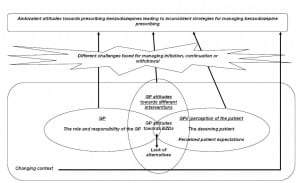 A new interview study from members of the CaHRU team, ‘Patients’ and clinicians’ experiences and perceptions of the primary care management of insomnia: qualitative study‘ provides further insights into primary care management of insomnia. The study team interviewed 28 patients and 23 health professionals (GPs, nurse, mental health workers and community pharmacists) and analysed the transcripts of these discussions.
A new interview study from members of the CaHRU team, ‘Patients’ and clinicians’ experiences and perceptions of the primary care management of insomnia: qualitative study‘ provides further insights into primary care management of insomnia. The study team interviewed 28 patients and 23 health professionals (GPs, nurse, mental health workers and community pharmacists) and analysed the transcripts of these discussions.
 They found that practitioners focused on treating the cause of insomnia rather than the insomnia itself, used sleep hygiene (which patients often disregarded) rather than cognitive behavioural therapy for insomnia and were ambivalent towards hypnotic drugs. They often prescribed hypnotics in ‘collusion’ with patients to prescribe to avoid confrontation or express empathy. Patients sometimes took hypnotics in ways that were not intended by their doctors, for example together with over-the-counter medication.
They found that practitioners focused on treating the cause of insomnia rather than the insomnia itself, used sleep hygiene (which patients often disregarded) rather than cognitive behavioural therapy for insomnia and were ambivalent towards hypnotic drugs. They often prescribed hypnotics in ‘collusion’ with patients to prescribe to avoid confrontation or express empathy. Patients sometimes took hypnotics in ways that were not intended by their doctors, for example together with over-the-counter medication.
 Both practitioners and patients were sometimes but not always concerned about addiction which led practitioners to sometimes prescribe despite these concerns but at other times withdraw hypnotics abruptly. Both patients and practitioners wanted more options and better training for the management of insomnia in primary care. The authors concluded that a better understanding of the current approaches and difficulties in the management of insomnia will help to inform more therapeutic options and health professional training. These findings build on previous work as part of the REST project (www.restproject.org.uk) which also led to development of an e-learning programme on insomnia (http://elearning.restproject.org.uk/).
Both practitioners and patients were sometimes but not always concerned about addiction which led practitioners to sometimes prescribe despite these concerns but at other times withdraw hypnotics abruptly. Both patients and practitioners wanted more options and better training for the management of insomnia in primary care. The authors concluded that a better understanding of the current approaches and difficulties in the management of insomnia will help to inform more therapeutic options and health professional training. These findings build on previous work as part of the REST project (www.restproject.org.uk) which also led to development of an e-learning programme on insomnia (http://elearning.restproject.org.uk/).













